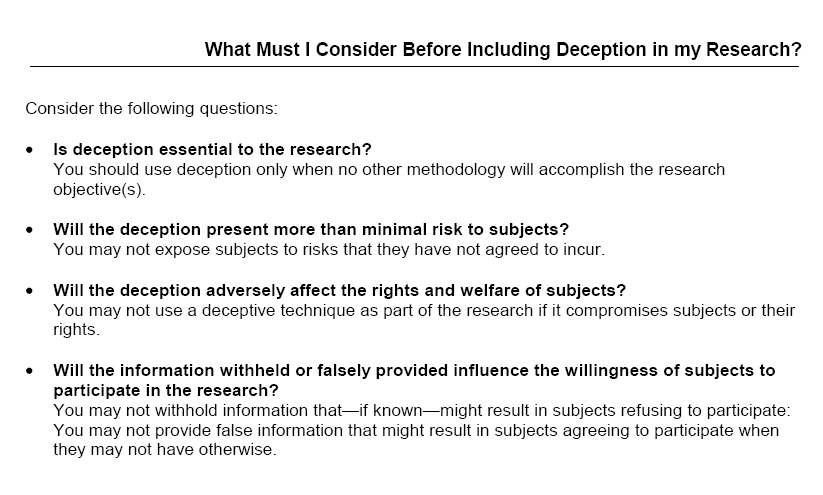In examining the ethics of debriefing, we must first examine the ethics of the research which might require it. While researching this subject I came across the following statement concerning the considerations of conducting research which included deception for which debriefing is considered to be necessary. These four statements seem to encompass the basic ideas of research ethics. From these statements, we can see that the primary concern is the welfare of the subjects.

Debriefing covers the area where the welfare of the subjects and the needs of the research overlap. That is, when it becomes possible to ethically conduct the research as long as the subjects are debriefed, the debriefing allows the research to continue because it can undo any possible harm. It is interesting to note that if these rules are very strictly followed, little if any, research would continue. One of the major problems with these statements is their lack of any measurable quantifiability. The word “minimal” is not a measurable quantity. I suggest that this word be modified by a more useful phrase, such as “minimal and temporary” or “minimal and rectifiable”.
Debriefing subjects of any research should probably be done more often, and not only in cases where deception was used. Why shouldn’t subjects be informed after the fact of the reasons and premises of the research? It might make more people willing to participate if this were done. More willing participants would make research projects more useful and valuable since the potentially larger population sources can provide more uniformity between the research and the control groups.
One interesting idea would be to create research projects in groups to be conducted sequentially and to use the same subjects, debriefing half after each segment and a half only after the last part of the project. After this, an analysis of the condition of all the subjects and a close examination of the differences between the two groups should yield some valuable information about the variability in the research and in the efficacy of debriefing. Debriefing after each segment should change the parameters greatly.
If we knew more about how debriefing affects the research and how it affects the subjects. Other research might be created to show the effects of not debriefing. However, ethical practice might prevent doing this kind of research. Perhaps it could be fictionalized and the many possible outcomes could be extrapolated and evaluated. It would make an interesting document, even though no actual scientific value might be obtained.
Nobody really knows what might happen if the other road is taken. That is the odd thing about research in social science. Since human subjects are all unique, any conclusions we draw are, necessarily, reasoned and fallible, because we cannot do them over again with the same subjects. Once the subjects have been through the research they have changed, even with debriefing, perhaps especially with debriefing. Therefore, these rules really must be adhered to, since the primary rule for medicine applies here as well: “First, do no harm.”
References
Hippocrates, 400 B.C. Myers, D, 1998, Psychology, 5th ed, New York, Worth St. Cloud University IRB Deception and Debriefing, 2008. Web.